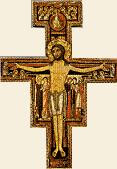
The only way to lead this life of divine love, in which all are made one in perfect Franciscan joy, is to cultivate intensely the life of prayer and contemplation. This is not a prayer that is performed only at a scheduled time; it is the type of prayer that characterized our Seraphic Father.
Saint Francis lived habitually in God and appeared a ‘living prayer.’ Celano tells us: ‘Thus he directed every thought and affection as one prayer which he addressed to the Lord, not so much like one praying, but as a living prayer.’ Such prayer implies a complete union with Almighty God, not only at the time appointed for prayer, but also during the course of the entire day.
Hence the admonition of Our Blessed Lord is fulfilled: ‘that they must always pray.'' Moreover, the supernatural life demands this habit of prayer, and consequently it is a requirement of our own Franciscan life and spirit. In his first rule Saint Francis shows us how complete our union with God must be: ‘In that Holy Charity which is God, I ask all the friars, both superiors and subjects, after they have put aside all burdens, anxieties, or worries, to serve, love, adore and honor the Lord God with a clean heart in whatever way they are best able. Our Lord Himself desires this above all things. And let us always fashion in ourselves a dwelling place and mansion for Him, Who is the Almighty Lord, the Father, the Son, and the Holy Spirit.''
















